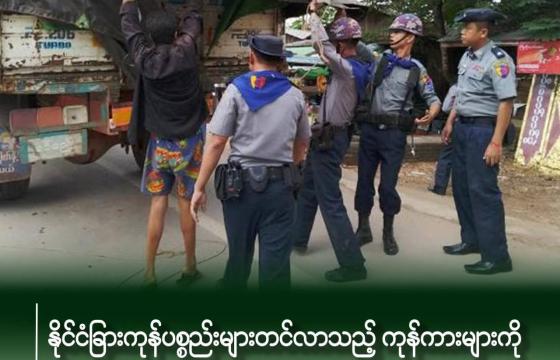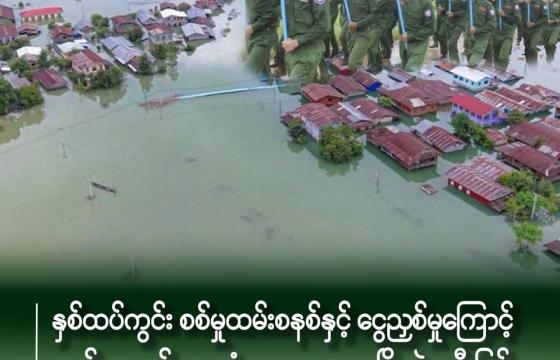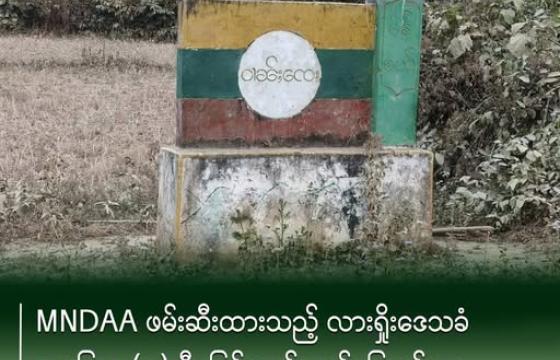As if the problem in Rakhine State, that has provoked international and UN condemnation on Naypyitaw and ever since the Rohingya’s exodus of some 700,000 to Bangladesh occurred last year in August, isn’t challenging enough, the inter-ethnic conflict flareup in northern Shan State which produced hundreds of internally displaced persons and civilians subjected to collateral damage has made headlines, adding another problem dimension to the existing woes of the country.
On November 23, the Shan State Progress Party/Shan State Army (SSPP/SSA) and Ta’ang National Liberation Army (TNLA) combined force clashed with the Restoration Council of Shan State/Shan State Army (RCSS/SSA) in Hsipaw Township, Hsur Khan village tract, Na Loc village, where three civilians were killed and two wounded.
“Clashes broke out between the two Shan armed forces. I don’t understand why they are fighting each other. I am not interested in their fighting. Civilians including children have been killed and wounded,” a relative of one of the victims told Shan Herald Tribune for News (SHAN).
At the same time, a 400 strong SSPP/TNLA force attacked RCSS outpost at Namtu Township, Panglong village tract, Nagar mountain for 4 days from November 20 to 23, according to Taifreedom news. But it is not clear whether the combined force was able to overrun the base.
The Northern Alliance, which was said to be involved in the recent conflict according to SHAN, includes the Arakan Army, the Kachin Independence Army, the Myanmar National Democratic Alliance Army, and the Ta’ang National Liberation Army. Villagers also reported that the SSPP was involved but it could not be confirmed, according to the SHAN.
As it is, the conflict is all the more complicated and sophisticated at times, as it resembles a cold war-like conflict pattern even though it will be premature to term the conflict as such.
Background
The inter-ethnic war has been going on between the TNLA and the RCSS escalated ever since the SSPP joined the TNLA openly a few months ago in trying to route out the RCSS from northern Shan State, which they claimed were being infringed by it, whose staging ground is supposed to be only in the southern part of Shan State.
The TNLA has been battling the RCSS, shortly after the latter signed the Nationwide Ceasefire Agreement (NCA) in October 2015, accusing it for intruding into its areas of operation. But the RCSS countered that it has been operating in the area since 2005 and hundreds of its reinforcement that the TNLA claimed coming from the south were in fact the Shans from the north that have finished their military training at its headquarters in Loi Tai Leng for months and were returning home to Namkham area, when they were ambushed by the TNLA forces in November 2015. Since then the inter-ethnic conflict has been going on until today.
This conflict becomes more complicated as the RCSS and SSPP are Shan armies and the SSPP joining the TNLA to battle the RCSS infuriated the Shan people in general. Besides, since the expansion of the TNLA just only a few years back from a few hundreds to some four to five thousand, reportedly financed by the Myanmar National Democratic Alliance Army (MNDAA) or Kokang and the United Wa State Army (UWSA), and its troops riding roughshod over the Shan population, the racial harmony that has existed for hundreds of years began to wane or call into question.
In short, the conflict has pitted Shan against Ta’ang or Palaung and also Shan against Shan, with some backing the SSPP and the other the RCSS, so much so that the Executive Council of Shan Sangha based in Panglong held Shan State-wide praying ceremony on August 20 for peace and reconciliation among Shan, including other ethnic groups within Shan State and beyond. But so far this hasn’t been able to stem the tide of inter-ethnic conflict.
And to make matter worse, an influential senior monk Baddanda Kalyana Wuntha, 47, who was active in the Kyaukme Sangha Maha Nayaka Committee, a government-appointed body of high-ranking monks working to bring stability to Shan community, was killed by unidentified armed men at around 6.30pm on October 5.
The monk was said to be against the two Shan armies fighting each other and had made known that any one involved would be excommunicated from Shan Buddhist culture by denying to accept offerings from such person. The SSPP and RCSS accused each other of the assassination but culprits have not been apprehended so far.
Given such complicated and overlapping conflict pattern in play, with the ongoing inter-ethnic conflict and the Tatmadaw engaging militarily with both the TNLA and two Shan armies, not to mention the creation of hardship for thousands of people caught up in the conflicts, the situation could be said as really dire by any standard.
The cold war-like animosity?
Many have been speculating that the north-south Vietnam-like conflict, even if it could be on a lesser, smaller scale, could be in the making.
The RCSS/SSA is seen as being influenced by Thailand, if not exactly its proxy, and the SSPP/SSA is firmly in the camp of Federal Peace Negotiation and Consultative Committee (FPNCC), a seven-party alliance which is led by the UWSA. The UWSA is seen as China’s proxy, although it may not be wholly true as it has shown more independence, in several instances, in political decision-making than merely following its directive regarding the peace process talks with the Myanmar government. But nevertheless, it has to depend on China to maintain its 30,000 or so army and socioeconomic well-being of the population and area it is in control.
The commitment of TNLA and SSPP is that the RCSS expanding influence in the north of Shan State, especially in areas where Shan/Tai ethnic majority reside like Namkham, Namtu, Hsipaw, Kyaukme Townships stretching till the Chinese border, has to be contained and pushed back.
The RCSS steadfastly insisted that it has been there in the north ever since 2005 and even with the willingness and invitation of the SSPP, long before the TNLA is formed.
The recent newly formed TNLA came into being again only after the disintegration of its former outfit the Palaung State Liberation Organization/Army (PSLO/A) and signed a ceasefire agreement with the government in 1991 and disarmed in 2005.
While nobody can say with certainty that the orders to route out the RCSS might have come from the UWSA or directly from its handlers, the armament and ammunition for Northern Alliance are definitely coming from that direction. Consequently, the RCSS is viewed as a pro-West camp and is not to be trusted mingling around China’s pipeline areas in the north and has to be cleared out, by any means.
If this is the case, the conflict between the SSPP/TNLA combined force and RCSS might be taking the form of cold war proxy conflict, as China-backed FPNCC against the pro-West RCSS. And with the Trump versus Xi trade war escalating, including the South China Sea problematic and lately, the Taiwan independence issue adding up as fuels to the China-US conflict, the conflict in Shan State might also become a case to consider in a broader context.
Analysis
Maybe this is just thinking out aloud and might not actually happen in an expanded version of cold war-like scenario. But nevertheless, it is in the interest of all stakeholders to end this inter-ethnic conflict before it becomes unmanageable.
In sum it is not conducive for the Tatmadaw to be involved in armed clashes with any of the Ethnic Armed Organizations (EAOs), NCA-signatories or non-signatories, much less mixing itself up in inter-ethnic conflict, if it wants to reboot the stalled peace process, which it is wholly to be blamed for torpedoing the top leadership meeting on October 15 with its Commander-in-Chief Min Aung Hlaing’s provocative opening speech against the EAOs.
China will benefit from the peaceful atmosphere in all forms, bilateral trade, other mega projects to security of its oil and gas pipelines, if the inter-ethnic conflict is contained, while the FPNCC will gain respect and respected political stature if it could step in as mediator than taking sides, especially where ethnic reconciliation and unity are concerned.
The SSPP and RCSS should consider truce as a first step, followed by negotiation in order to resolve the territorial control-based conflict. The same is also true for the TNLA as inter-ethnic conflict only disillusioned the Shan State rural population, Shan and Palaung alike, who have to bear the brunt of collateral damage.
Finally, all warring parties should consider “human security” as a priority for the people they said they fought for. Otherwise, their struggle for rights of self-determination, equality and democracy will become meaningless.
“There are essentially seven issues associated human security. These are economic security, food security, health security environmental security, personal security, community security, and political security,” according to Human Development Report 1994, titled “New Dimensions of Human Security”.







